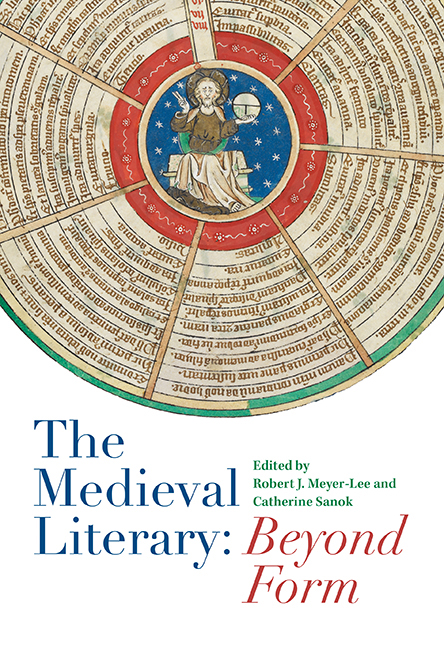Introduction: The Literary through – or beyond? – Form
Published online by Cambridge University Press: 12 October 2019
Summary
When we read or teach a poem such as the Middle English Pearl – a poem remarkable for both formal and theological intricacy – as a work of “literature,” what bearing or priority does its form have? Do we attend to its form because that form is what identifies this religious text as “literary,” or does the form become “literary” as result of the kind of attention that we give to the text, or the use to which we put it? To what extent, that is, does “reading for form,” the basic injunction of Old as well as New Formalism, involve identifying the elusive quality that makes a work “literature,” or, conversely, to what extent is a particular kind of formalist approach, mediated by institutional context, responsible for producing the category we have named “literature”? On the one hand, it may be that we recognize features of some texts as “literary form” because these works have been received as “literary” for reasons that are not strictly, or solely, formal. On the other, we may identify some texts – perhaps especially premodern texts, written before “literature” was fully theorized as such – as literary, regardless of their cultural status in the historical moment in which they were produced, because of the correspondence between their formal qualities and later conceptualizations of the literary. Our operative understanding of the “literary,” that is, which inevitably derives from post-medieval conceptualizations of the category, plays some role in determining what counts as literary form. This volume seeks to explore a fundamental methodological question that emerges with particular clarity in the case of medieval literature: since all texts have a form, what determines which forms are literary, and why, and how, and when?
The essays collected here explore the forms of particular texts and traditions in order to consider whether or how they relate to medieval and post-medieval notions of the literary. Through these varied case studies, the volume seeks to examine the presumed relationship between form and the literary that has always lurked in the field but which has become more palpable and more consequential with the recent return to formalist approaches and – perhaps related to this critical turn – recent efforts to define and justify literary scholarship in the face of declining institutional support and increasing skepticism about the value of humanistic inquiry in general.
- Type
- Chapter
- Information
- The Medieval Literary: Beyond Form , pp. 1 - 12Publisher: Boydell & BrewerPrint publication year: 2018



